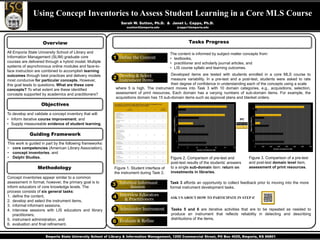Melden
Teilen
Downloaden Sie, um offline zu lesen

Empfohlen
Empfohlen
This presentation is from the Association for Educational Communications and Technology (AECT) international convention held in Anaheim, CA on November 1, 2013. The research was funded by the University Fellows Program at Ashford University, part of Bridgepoint Education (BPE).Correlating Outcomes of Quality Matters Standard 5.2 in Asynchronous Discussions

Correlating Outcomes of Quality Matters Standard 5.2 in Asynchronous DiscussionsBarbara M. Hall, PhD
Weitere ähnliche Inhalte
Was ist angesagt?
This presentation is from the Association for Educational Communications and Technology (AECT) international convention held in Anaheim, CA on November 1, 2013. The research was funded by the University Fellows Program at Ashford University, part of Bridgepoint Education (BPE).Correlating Outcomes of Quality Matters Standard 5.2 in Asynchronous Discussions

Correlating Outcomes of Quality Matters Standard 5.2 in Asynchronous DiscussionsBarbara M. Hall, PhD
Was ist angesagt? (20)
LAK '17 Trends and issues in student-facing learning analytics reporting sys...

LAK '17 Trends and issues in student-facing learning analytics reporting sys...
Using real-time dashboards to improve student engagement in virtual learning ...

Using real-time dashboards to improve student engagement in virtual learning ...
Understanding, predicting and optimizing learning with Learning Analytics

Understanding, predicting and optimizing learning with Learning Analytics
The latest assigned task amendment based on the new working title.

The latest assigned task amendment based on the new working title.
Using Knowledge Graph for ExplainableRecommendation of External Content inEle...

Using Knowledge Graph for ExplainableRecommendation of External Content inEle...
Lamar coehd regional_research_presentation_final_3-23-12

Lamar coehd regional_research_presentation_final_3-23-12
Correlating Outcomes of Quality Matters Standard 5.2 in Asynchronous Discussions

Correlating Outcomes of Quality Matters Standard 5.2 in Asynchronous Discussions
Andere mochten auch
Andere mochten auch (7)
Ähnlich wie Alise2014 30 40 d7
This presentation was given by Russell Michalak, MLIS and Monica D.T. Rysavy, Ph.D. at the PA Forward Information Literacy Summit in State College, PA in 2016.Assessing and Expanding Information Literacy Skills with Online Instructional...

Assessing and Expanding Information Literacy Skills with Online Instructional...Dr. Monica D.T. Rysavy
Ähnlich wie Alise2014 30 40 d7 (20)
Assessing for Improvement: learning outcomes assessment for library instruction

Assessing for Improvement: learning outcomes assessment for library instruction
Looking for Information Literacy: Using syllabi to map strategic information ...

Looking for Information Literacy: Using syllabi to map strategic information ...
Open Academic Analytics Initiative - Campus Technology Innovator Award Presen...

Open Academic Analytics Initiative - Campus Technology Innovator Award Presen...
Technology-enhanced assessment and feedback: What should (and shouldn’t) we b...

Technology-enhanced assessment and feedback: What should (and shouldn’t) we b...
Learner Analytics and the “Big Data” Promise for Course & Program Assessment

Learner Analytics and the “Big Data” Promise for Course & Program Assessment
Incorporating Information Fluency into Classroom Instruction

Incorporating Information Fluency into Classroom Instruction
Assessing and Expanding Information Literacy Skills with Online Instructional...

Assessing and Expanding Information Literacy Skills with Online Instructional...
Mehr von Sarah Sutton
Mehr von Sarah Sutton (10)
Academic libraries, open access, institutional repositories, and the public good

Academic libraries, open access, institutional repositories, and the public good
Core Competencies for Electronic Resources Librarians Update ALAMW 2014 1-25

Core Competencies for Electronic Resources Librarians Update ALAMW 2014 1-25
Alise2014 30 40 d7
- 1. Using Concept Inventories to Assess Student Learning in a Core MLS Course Sarah W. Sutton, Ph.D. & Janet L. Capps, Ph.D. ssutton3@emporia.edu Tasks Progress Overview All Emporia State University School of Library and Information Management (SLIM) graduate core courses are delivered through a hybrid model. Multiple systems of asynchronous online modules and face-toface instruction are combined to accomplish learning outcomes through best practices and delivery models most conducive for particular concepts. However, this goal leads to questions. What are these core concepts? To what extent are these identified concepts supported by academics and practitioners? jcapps1@emporia.edu The content is informed by subject matter concepts from: • textbooks, • practitioner and scholarly journal articles, and • LIS course syllabi and learning outcomes. Developed items are tested with students enrolled in a core MLS course to measure variability. In a pre-test and a post-test, students were asked to rate their degree of confidence in understanding each of the concepts using a scale where 5 is high. The instrument moves into Task 3 with 10 domain categories, e.g., acquisitions, selection, assessment of print resources. Each domain has a varying numbers of sub-domain items. For example, the acquisitions domain has 15 sub-domain items such as approval plans and blanket orders. Objectives To develop and validate a concept inventory that will: • Inform iterative course improvement, and • Supply measureable evidence of student learning. KEY Pre-test count Post-test count Guiding Framework This work is guided in part by the following frameworks: • core competencies (American Library Association), • concept inventories, and • Delphi Studies. Methodology Concept inventories appear similar to a common assessment in format; however, the primary goal is to inform educators of core knowledge levels. The process consists of six general tasks: 1. define the content, 2. develop and select the instrument items, 3. informal informant sessions, 4. interview sessions with LIS educators and library practitioners, 5. instrument administration, and 6. evaluation and final refinement. Figure 1. Student interface of the instrument during Task 2. Figure 2. Comparison of pre-test and post-test results of the students’ answers to a single sub-domain item: return on investments in libraries. Figure 3. Comparison of a pre-test and post-test domain level item, assessment of print resources. Task 3 affords an opportunity to collect feedback prior to moving into the more formal instrument development tasks. ASK US ABOUT HOW TO PARTICIPATE IN STEP 4! Tasks 5 and 6 are iterative activities that are to be repeated as needed to produce an instrument that reflects reliability in detecting and describing distributions of the items. Emporia State University School of Library & Information Management, 1200 Commercial Street, PO Box 4025, Emporia, KS 66801
